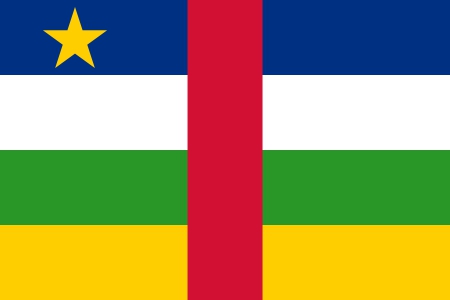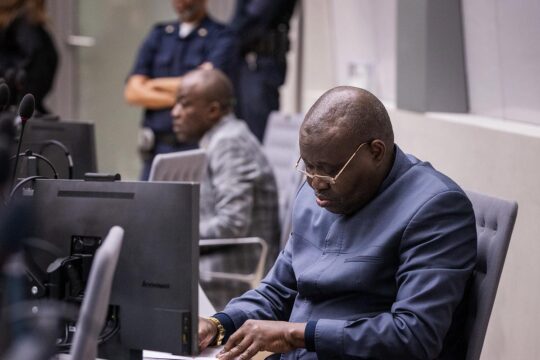On June 3, Catherine Samba-Panza, interim president of the Central African Republic, promulgated a law creating a Special Criminal Court to investigate and prosecute grave human rights violations committed in the country since 2003. Her action crowned a speedy nine-month drafting and legislative process.
This is good news, not just for the people of the Central African Republic who have suffered so much, but also for victims around the world seeking effective solutions to curb impunity.
For the first time, a sovereign government has created through national law an innovative hybrid court where national, international judges and prosecutors will work together for victims to obtain justice for the atrocities they have suffered. If implemented well, the Special Criminal Court in the Central African Republic has the potential to become a new model of justice for grave international crimes.
The interim government acknowledged early on that the national justice system, ravaged by a series of conflicts, was too weak to handle the large scale atrocities during the most recent crisis—in which thousands of civilians were brutally killed and hundreds of thousands displaced.
In April 2014, it referred the situation since 2012—when the most recent crisis began—to the International Criminal Court (ICC) [PDF]. The office of the ICC prosecutor, which already had opened an investigation into an earlier period of violence, opened a second investigation in the Central African Republic in September 2014, offering real hope for a measure of justice. But it was always clear that the ICC could only be one part of the solution given its capacity to handle only a small number of cases in each given situation.
In August 2014, the interim government signed a Memorandum of Understanding with the UN peacekeeping mission that sketched out the idea of hybrid justice mechanism. With advice from a drafting committee of national and international legal experts and the input from civil society, the Justice Ministry drafted a law for a specialized court inside the national justice system to try crimes that were not likely to be selected by the ICC. On April 22, 2015, the country's interim parliament, the National Transitional Council, adopted the law by a vast majority. It tasked the new court with investigating crimes committed since 2003—the date of a coup against an elected president, Ange-Félix Patassé, which was marked by a wave of abuses against civilians—instead of 2012, as proposed by the interim government.
There have been other hybrid courts and chambers, such as the Special Court for Sierra Leone, the Extraordinary Chambers in the Courts of Cambodia, the war crimes chamber in Bosnia and Herzegovina and Senegal's Extraordinary Chambers, created for the upcoming trial of the former Chadian president Hissène Habré.
But this is the first time that national lawmakers have created a hybrid court to try serious international crimes committed in their own country and to work alongside the ICC. The Special Criminal Court is a temporary court embedded within the Central African Republic's national justice system for a renewable period of five years. It has its own judicial police and prosecution office and all levels of jurisdiction up to the appeals chamber. It will apply the country's law and criminal procedure.
The law foresees that the Special Criminal Court will have a majority of Central African judges, a Central African president and chief registrar, while the chief prosecutor will be international. The law also foresees that the court can be set up in phases, allowing its investigative arm to get to work quickly, before the rest of the court is set up. If the ICC and the Special Criminal Court happen to work on the same cases, priority will go to the ICC, reversing the principle of complementarity in the ICC Statute [PDF] that gives national courts precedence. The newly established Special Criminal Court also does not deprive ordinary courts of their jurisdiction over grave international crimes.
The Special Criminal Court is thus firmly situated at a unique and new level, between the ICC and ordinary courts. If it plays its role as a complement to both, it could significantly increase access to justice for the victims in the Central African Republic.
Recurrent crises in the Central African Republic over the past few decades have been marked by widespread impunity. The people of the Central African Republic and their political representatives have decided to turn the page on this practice. The thirst for justice was clear during national talks in May in the capital, Bangui, known as the Bangui Forum for National Reconciliation. Participants emphasized the need for justice and showed strong support for the ICC, the Special Criminal Court, a Truth and Reconciliation Commission and reparations for victims as complementary tools to ensure accountability.
In the face of high expectations and a complex accountability landscape, there are many challenges ahead in ensuring the Special Criminal Court fulfills its objectives. As they embark on establishing the new institution, Central African and international actors should spare no effort to ensure that it will be cost-effective, impartial, fair and credible in delivering justice for the worst crimes.
The international community will need to provide adequate financial and logistical support to the court on the basis of a realistic budget drawn up by the interim government and the UN. As foreseen in its mandate, the peacekeeping mission will play a critical role in assisting the new court with recruiting staff, supporting investigations, arrests, security for judicial staff and protection of victims and witnesses. Other UN agencies involved in supporting justice and the rule of law will also have an important role to play, and the UN should effectively coordinate and implement this crucial assistance.
The Special Criminal Court will need to be staffed with competent and motivated personnel. The Central African government and the UN should set out a clear recruitment process and identify the qualifications required. Selected national and international candidates should be experienced, independent and willing to work in a collaborative environment. International experts should not only speak French and be familiar with the civil law system, but also have demonstrated expertise in investigating and prosecuting grave international crimes and in interacting with vulnerable victims—including victims of sexual and gender violence, women and children.
The ICC and the Special Criminal Court will need to work out ways to cooperate, share information and coordinate their work so that their coexistence in one country will truly multiply opportunities for justice.
Finally, to have long term impact at the national level, the establishment of the Special Criminal Court should be an opportunity to enhance the ordinary courts' capacity to handle grave international crimes. Shared training and workshops could be organized for staff at both levels, for example regarding specialized investigation techniques and the protection of victims or defense rights.
Given the resource limitations of the ICC and lack of capacity or will of national courts, the Special Criminal Court model has the potential to strengthen the fight against impunity within the countries where the crimes happened. Other countries have considered the establishment of hybrid courts or chambers, but have not yet taken the final plunge.
The eyes of the world will be on the Central African Republic and its new hybrid court. For the victims there and others elsewhere who are waiting for justice, it cannot fail.
© Géraldine Mattioli-Zeltner, Taking Justice to a New Level The Special Criminal Court in the Central African Republic, JURIST - Hotline, July 9, 2015, http://jurist.org/hotline/2015/07/G%C3%A9raldine-Mattioli-Zeltner-CAR-Special-Court.php






